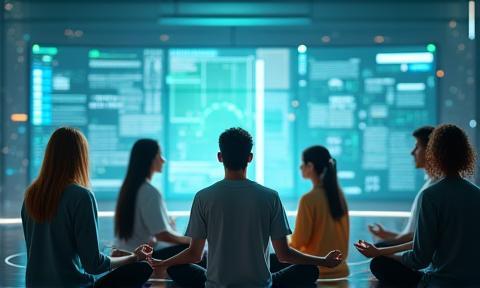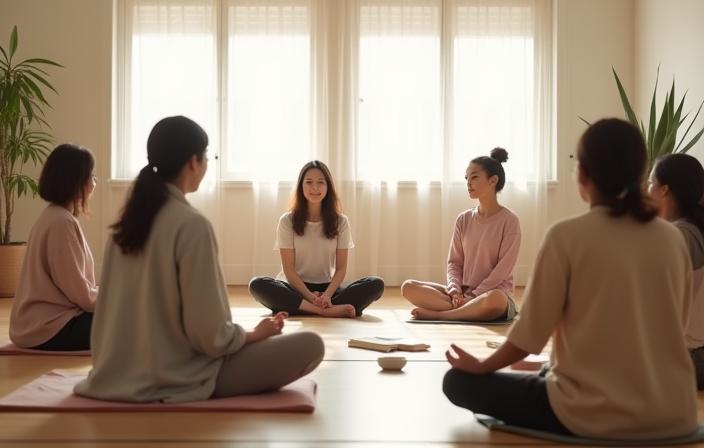Empowering Growth for Every Mind
Harnessing technology to unlock your personal potential. At Mirai Growth Solutions, we believe that digital transformation can bring self-improvement resources within everyone's reach—anywhere in the world, and for every journey.
Support Our Mission—Get Involved

Who We Are
Mirai Growth Solutions was founded in the vibrant city of Tokyo, with a vision to democratize personal development in Japan and worldwide. For over a decade, we’ve blended the precision of neuroscience with the empathetic reach of non-profit action, designing platforms that empower real transformation. Our journey began as a small group of technologists and educators passionate about holistic well-being, and rapidly grew into a fully established organization supported by a diverse, multilingual community.
We believe every individual deserves access to meaningful self-improvement resources, regardless of social status, background, or geography. At the heart of our values is inclusivity: our platforms support users from all walks of life, enabling wellness and growth beyond the boundaries of conventional self-help models.
Transparency is integral to our mission—every initiative is open, results-driven, and regularly assessed to maximize impact. We champion ethical technology, ensuring our AI-driven tools respect privacy and autonomy. Our multi-disciplinary team brings together innovative educators, dedicated mental health professionals, developers, and community organizers. Together, we aim to not just follow trends, but pioneer the creator-empowered, wellness-driven future.
As a nonprofit, we reinvest all resources into our programs, expanding outreach to schools, universities, minority support groups, and marginalized communities across Tokyo and beyond. Our core services are free, and we offer additional voluntary-payment tiers to sustain growth and innovation. Mirai Growth Solutions also facilitates workshops, knowledge-sharing events, and collaborative research to foster a supportive ecosystem of growth.
Our digital wellness solutions have been featured by local government agencies, covered by national press, and embraced by people from all generations. In a fast-changing world, we value the Japanese principle of kaizen—continuous improvement—and invite others to join us in this lifelong pursuit.
We strive to be culturally mindful and globally relevant, integrating meditation narratives and esteem-building practices drawn from both Eastern and Western traditions. Every tool, every initiative, every conversation is a step toward our mission: to build a future in which personal growth is possible for everyone, everywhere.
- •Evidence-based digital wellness tools
- •AI-powered coaching and mentorship
- •Inclusive support for all backgrounds
- •Transparent nonprofit initiatives
Our Initiatives
Leading-edge projects and platforms designed to support self-improvement journeys, emotional well-being, and community empowerment. Every initiative at Mirai Growth Solutions is shaped by rigorous research, innovative technology, and a deep understanding of people’s real challenges.

Digital Self-Improvement Platform
Our signature platform combines neuroscience-backed practices with modern digital design to create a pathway for everyone. Through personalized dashboards, habit assessments, and daily lessons, users can embark on well-structured self-improvement journeys at their own pace. Features include progress visualization, community support, and integration with wearable devices, bringing growth directly into your everyday routines. Every module is crafted in collaboration with certified wellness coaches and trainers, ensuring best-in-class guidance.

AI-Based Coaching
Our AI coaching suite provides individualized support with the empathy of a mentor and the insight of behavioral science. Whether setting new routines, overcoming obstacles, or pursuing ambitious goals, users receive actionable daily feedback and encouragement. Our algorithms adapt to each individual's needs, creating a customized learning curve and dynamic reminders. Emphasis is placed on ethical AI, meaning user data and privacy are respected at every step.

Mindfulness & Meditation
Our library of mindfulness sessions is inspired by both Japanese zazen and global meditative practices. Guided meditations and soundscapes, curated by experienced mindfulness trainers, provide easily accessible stress reduction and calm. Real-time focus tracking and breathing exercises make it simple to build resilience, concentrate during busy days, and nurture compassion for both oneself and others. Community meditations support collective well-being and foster a culture of openness.
Habit Tracking & Microlearning
Our interactive habit trackers use visual cues and positive reinforcement to help users develop and maintain healthy routines. Bite-sized microlearning modules cover topics such as productivity, emotional regulation, sleep, and physical health, allowing users to make incremental, lasting improvements. Notifications and gamified challenges foster ongoing motivation, turning everyday actions into stepping stones toward sustained growth.
Our Impact
We measure success by the lives we touch. Each milestone at Mirai Growth Solutions reflects our deep-rooted commitment to real, sustainable change—empowering individuals, supporting communities, and building a better tomorrow.

Community Transformation in Suginami
In Suginami, Tokyo, our Mindfulness Toolkit pilot program made a tangible difference: more than 2,000 residents participated in a three-month journey focused on stress reduction, emotional regulation, and sustainable habit creation. After completion, 87% of participants reported noticeable improvements in daily well-being and stress handling.
This initiative inspired new collaborations with local organizations and set a precedent for our approach to grass-roots change—emphasizing actionable results, mutual support, and culturally relevant interventions. We continue to expand these local empowerment programs citywide and beyond.
Voices of Change



Upcoming Events & Workshops
Join our latest programs to experience personal growth in action. Whether you are seeking to deepen your mindfulness practice or begin a journey of digital mentorship, our events are open to everyone inspired by well-being and self-improvement.

Annual Mindfulness Summit 2024
Date: November 25, 2024 Time: 10:00–16:00 JST
Location: Tokyo Midtown Hall
A gathering for thought leaders, practitioners, and anyone passionate about the cognitive science of well-being. Expect inspiring keynote speakers, interactive workshops, group meditations, and opportunities to connect with Tokyo's vibrant wellness community. Admission is free for NPO partners and students; live interpretation in English and Japanese available.
Register Now
Volunteer Orientation: Digital Wellness Mentors
Date: July 10, 2024 Time: 14:00–16:00 JST
Location: Online (Zoom)
Become a digital mentor and make a meaningful difference through individualized remote support. Orientation covers basics of our ethical mentoring program, guidelines for supporting users online, and opportunities to collaborate with peers. Open to all backgrounds; Japanese and English support offered.
Apply to VolunteerMeet Our Team
A passionate group of technologists, coaches, and community advocates working together to redefine personal development for all.

Akira Tanaka
Executive DirectorAkira leads Mirai Growth with a vision for inclusive, technology-driven well-being. With 15+ years in nonprofit leadership and a background in behavioral psychology, Akira is dedicated to fostering open innovation and cross-cultural engagement for the organization. He has implemented large-scale digital wellness programs in Japan, always championing transparency and user empowerment.

Emiko Suzuki
Program ManagerEmiko oversees the development and delivery of our digital coaching and microlearning programs. Her expertise in adaptive learning design and her commitment to outreach have broadened our impact across universities and local communities. Emiko is especially recognized for her work creating inclusive resources for youth and older adults alike.

Daniel Wang
Lead AI DeveloperDaniel is the creator of our ethical AI-powered wellness tools. With a decade of experience building accessible, effective digital platforms, Daniel’s approach always centers user privacy and ease of use. He mentors our tech team, drives innovation in AI-based learning, and pushes the boundaries of responsible technology.
Frequently Asked Questions
Contact Us
Reach out for partnership, support, volunteering, or to learn more about our cause and programs. We're here to help you take that first (or next) step in your personal growth journey.
- Email: info@
- Phone: +81 3-1234-5678
- Location: 5-12 Shinjuku 3-chome, 7th Floor, Tokyo 160-0022, Japan
- Business Hours: Monday–Friday: 09:00–18:00 JST


